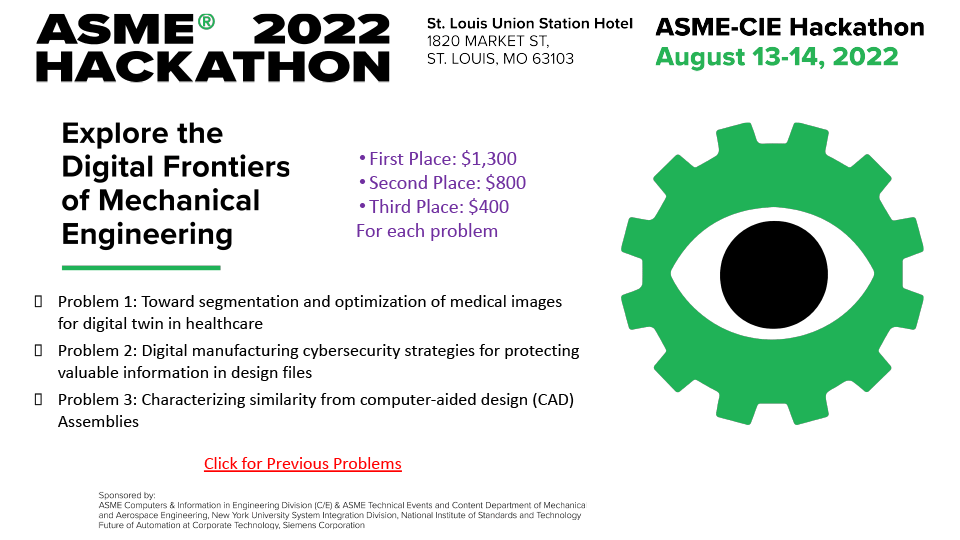Background
The Computer & Information in Engineering (CIE) Division of the American Society of Mechanical Engineers (ASME) held two hackathon events at the IDETC/CIE 2020 and 2021 Conferences. These 24-hour hackathon events provide students and engineering practitioners with a unique opportunity to learn how data science and machine learning techniques can be leveraged to solve real-world engineering problems.
Given the previous resounding successes, the CIE Division will hold the ASME-CIE Hackathon again at the IDETC/CIE 2022 Conference, for the first time in-person, as a pre-conference event from Aug. 13-14, 2022. With the goal of creating a platform for crowd innovation and, more importantly, exploring new educational pathways to train the next generation of data-literate mechanical engineers, the hackathon leadership team is now soliciting new topic ideas.
Click to Register for the Hackathon
Important Dates:
- Sign up Deadline August 4th 11:59pm EDT
- August 13, 2022: Hackathon Kick-off
- August 14, afternoon: Due for Hackathon deliverables
- August 14, evening: Awarding ceremony
Hackathon Problems
- Problem 1: Toward segmentation and optimization of medical images for digital twin in healthcare
- Problem 2: Digital manufacturing cybersecurity strategies for protecting valuable information in design files
- Problem 3: Characterizing similarity from computer-aided design (CAD) Assemblies
Download the problem statement here!
| Date and Time (Central Daylight Time) | Agenda | |
| DAY 1, August 13 | 1:00 – 2:00 pm | In-person registration, online check-in and virtual platform testing |
| 2:00 – 3:15 pm | Hackathon kick-off, introduction of topic areas and opening refreshment | |
| 3:15 – 4:15 pm | Team formation and meeting with your mentors | |
| 4:15 – 6:30 pm | Problem formulation and proposal submission (Q&A session will run in parallel from 5:30 to 6:30 pm) | |
| 6:30 – 7:30 pm | Dinner | |
| 7:30 – 9:30 pm | Hackathon continues; pitching ideas based on the preliminary proposal/project plan (Q&A session will run in parallel from 7:30 to 8:30 pm) | |
| DAY 2, August 14 | 07:00 – 8:00 am | Breakfast |
| 8:00 – 8:15 am | Day 2 kick-off and judging criteria recap | |
| 9:45 – 12:00 pm | Hackathon pitch time (Q&A session will be available from 11:00 am to 12:00 pm; Morning break with refreshment from 9:45 to 10:15 pm) | |
| 12:00 – 1:00 pm | Lunch | |
| 1:00 – 4:30 pm | Hackathon pitch time (Q&A session will be available from 2:30 pm to 3:30 pm; Afternoon break with refreshment from 3:00 to 3:30 pm) | |
| 4:30 – 5:00 pm | Project submission | |
| 5:00 – 5:15 pm | Break | |
| 5:15 – 6:30 pm | Project presentations | |
| 6:30 – 7:00 pm | Judge discussion and deliberation | |
| 7:00 – 9:00 pm | Dinner & Awards and closing ceremony | |
Award Information
For each problem:
- First Place: $1300
- Second Place: $800
- Third Place: $400
Eligibility
Both students and non-students (e.g., researchers from national labs, professionals from industry, etc.) are welcome to attend the Hackathon and experience the exciting competitions. Participants can register for the event as (1) a student or (2) a non-student. Note: non-student groups include any group with a non-student member, even in the case when several members of the group are students. Per the funding objective, non-student participants are not eligible for travel awards and prizes. Each group category will be independently assessed and will receive their own rankings within the group category.
Teamwork
Hackathon is a teamwork. You do not need to have all the skills – that’s what TEAMWORK is for! Please join us if you have:
- Creative or innovative ideas
- Business or marketing talents
- Data science or statistics concepts
- Domain knowledge and critical thinking
- Computational linguistics skills
- Programming skills
Hackathon Team and Presentation
- All participants must be registered by July 8th. Everyone will be placed in a team up to three members. You may form your own. All implementation must be based on the original work.
- Each Hackathon team will continue their own meetings via their own chosen platform or in person and hacking exercises during the two days between 08/13/22 and 08/14/22.
- Each team needs to present their teamwork including the technical approach and the results.
